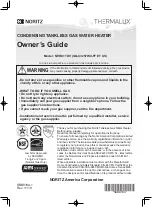
20
5.
Remove the bolts from each element.
6.
Remove the elements from the openings.
•
Use a twisting, pulling action to remove elements
scaled beyond size of the tank openings.
•
Brush loose scale from elements.
7.
Lime scale removal.
•
Place limed ends of heating elements into UN•LIME
delimer and allow scale to dissolve. Do not permit
delimer or water to contact heating element electrical
terminals.
Other scale removal:
•
Silicates, sulfates and aluminates must be removed
by scraping or other mechanical means. Lime scale
solvents will not remove these types of scale
which are occasionally encountered.
8.
Flush cleaned ends of elements with water when deliming
or cleaning is completed.
9.
Remove sediment and scale from the tank bottom through
the access provided by the element opening(s).
•
The cold water inlet valve and drain valve may be
opened to aid the cleanout process.
10. Clean remaining gasket material from tank and element
flanges. DO not reuse original element gaskets.
•
The element gaskets should be replaced whenever an
element is removed.
11. Put new gaskets on each element and install into tank
openings.
•
Uniformly tighten element bolts.
12. Attach element wires to connection points from which
they were removed.
13. Follow FILLING instruction to restore hot water service.
•
Check for water leaks around elements and proper
operation when heater is filled.
•
Close front access door.
CHECKLIST
Before calling for service, check the following points to see if
the cause of trouble can be identified and corrected. Reviewing
this checklist may eliminate the need of a service call and quickly
restore hot water service. Figure 1 identifies the location of all
of the heater components.
BE SURE TO TURN OFF THE ELECTRICITY WHEN CHECKING
EQUIPMENT.
Not enough or no hot water.
1.
Be certain the electrical disconnect switch serving the
water heater is in the ON position.
2.
Check the fuses.
•
The electrical disconnect switch usually contains
fuses.
3.
If the water was excessively hot, and is now cold, the
high limit switch may have operated.
•
To reset, remove the plug from the top cover of the
heater and push the reset button.
•
Repeated operation of the high temperature cutoff
should be investigated by your dealer.
4.
The capacity of the heater may have been exceeded
by a large demand for hot water.
•
Large demands require a recovery period to restore
water temperature.
5.
Cooler incoming water temperature will lengthen the
time required to heat water to the desired temperature.
6.
Look for hot water wastage and leakage.
7.
Sediment or lime scale may be affecting water heater
operation. Refer to page 18 for details.
Water is too hot
1.
Refer to TEMPERATURE REGULATION.
Water heater makes sounds
1.
Sediment or lime scale accumulations on the elements
causes sizzling and hissing noises when the heater is
operating.
•
The sounds are normal. However, the tank bottom `
and elements should be cleaned. Refer to page 18
for details.
2.
Some of the electrical components of the water heater
make sounds which are normal.
•
Contactors will “click” or snap as the heater starts
and stops.
•
Contactors often hum.
Water leakage is suspected.
1.
Check to see if the heater drain valve is tightly closed
2.
If the outlet of the relief valve is leaking it may represent:
•
Excessive water temperature.
•
Faulty relief valve.
•
Excessive water pressure.
•
Excessive water pressure is the most common cause
of relief valve leakage. It is often caused by a “closed
system”. A check valve in the inlet system will not permit
the expanded hot water volume to equalize pressure
with the main. A relief valve must release this water or
the water heater or plumbing system will be damaged.
Summary of Contents for DSE-120-24
Page 2: ......
Page 4: ......
Page 6: ......
Page 8: ......
Page 10: ......
Page 12: ......
Page 14: ......
Page 16: ......
Page 30: ...15 SMALLCOMMERCIALWIREDIAGRAM 208 240V 3PH SMALLCOMMERCIALWIREDIAGRAM 208 240V 3 1PH...
Page 32: ...17 SMALLCOMMERCIALWIREDIAGRAM SINGLEPHASE SMALLCOMMERCIALWIREDIAGRAM 300 600V 3PH...
Page 40: ......
Page 41: ...SECTION 2 REPLACEMENT PARTS GUIDE...
Page 42: ......













































